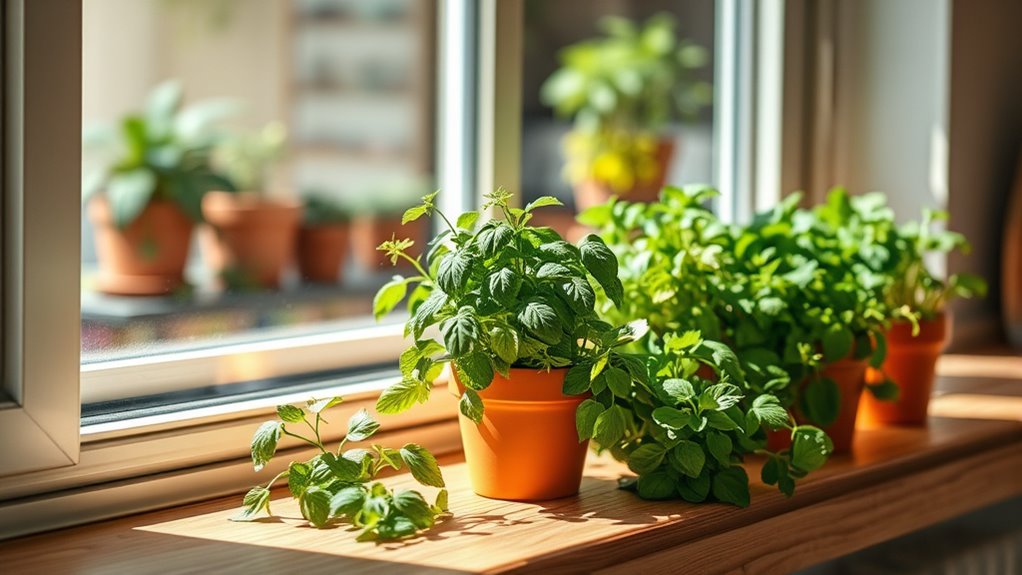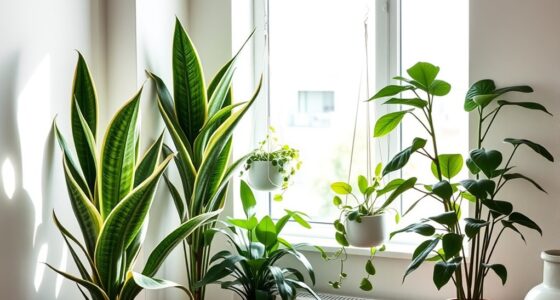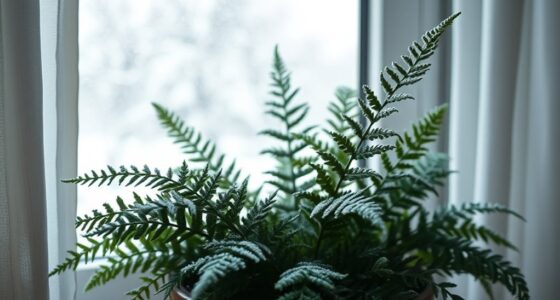To create a simple windowsill herb garden, choose resilient herbs like basil, parsley, thyme, or mint in healthy starter plants. Pick pots with drainage holes, fill them with organic potting mix, and plant your herbs at the right depth. Place your container in a south-facing window for ample sunlight and water only when the soil feels dry. Regular pruning and proper watering can keep your herbs thriving. Keep going for more tips to grow a lush indoor garden!
Key Takeaways
- Choose resilient herbs like basil, parsley, and mint that thrive in indoor sunlight.
- Use pots with drainage holes filled with organic, light potting mix for healthy roots.
- Place your herbs on a south-facing windowsill for 4-6 hours of direct sunlight daily.
- Water only when the top inch of soil feels dry, avoiding overwatering or waterlogging.
- Regularly prune and rotate herbs to promote bushiness and ensure even light exposure.
Choosing the Right Herbs and Plants
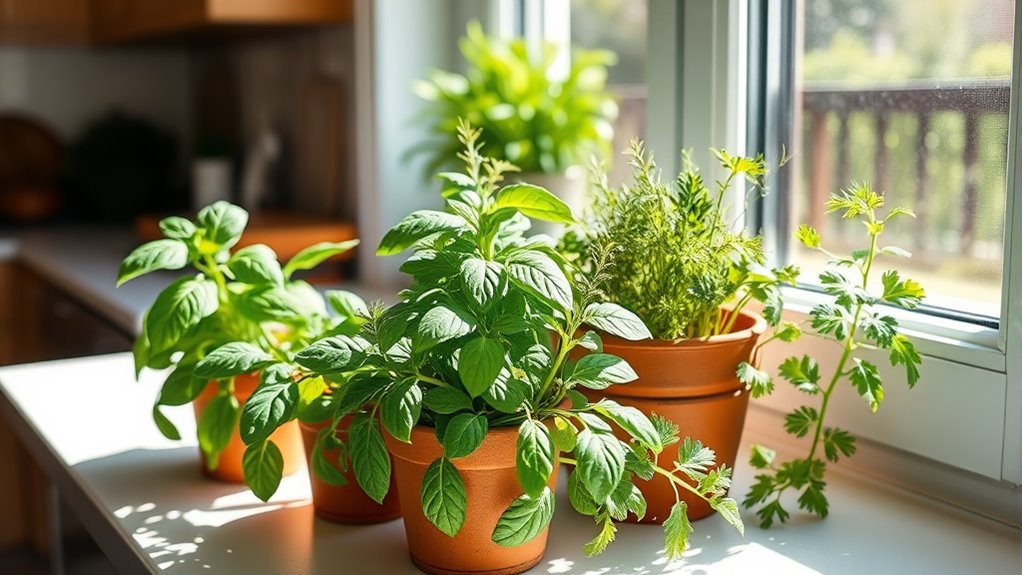
When selecting herbs for your windowsill garden, it’s best to focus on versatile varieties like basil, parsley, thyme, and mint, as they thrive indoors year-round. Choose healthy starter plants from nurseries or grocery stores to ensure a strong start. Incorporating natural sunlight can significantly boost your herbs’ growth and health, making them more resilient indoors. Herbs suited to indoor growth are often resilient, like rosemary and sage, which can handle occasional stress. Avoid fragile herbs such as cilantro and chervil, as they’re more sensitive to indoor conditions. Use organic potting mix to provide essential nutrients and promote healthy growth. Make sure your herbs get natural sunlight daily, and leave enough room for them to grow comfortably. Incorporating effective payment solutions can help manage your gardening expenses more efficiently, especially if you’re purchasing supplies online. Understanding city dynamics can help you better care for your herbs and optimize their growth indoors, especially if you live in an apartment with limited sunlight. Additionally, considering retirement planning strategies can be beneficial if you’re investing in long-term assets, just like selecting the right herbs for your garden. Proper soil quality and proper watering routines are also crucial for healthy herb development. Selecting the right herbs with these factors in mind sets a solid foundation for a thriving windowsill garden.
Selecting and Preparing Containers
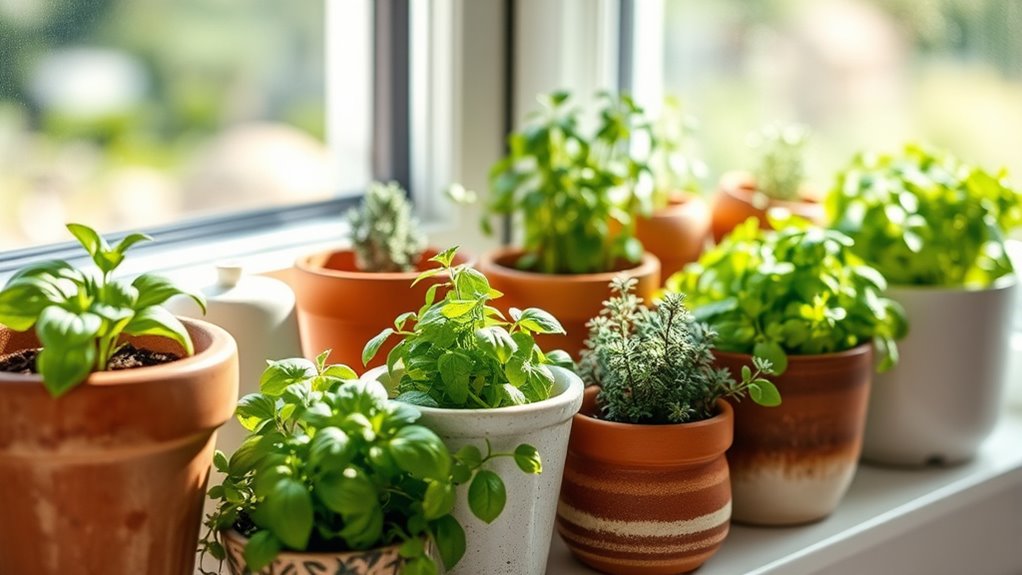
Choosing the right containers is essential for a healthy windowsill herb garden. You want pots that are at least 4 inches deep with drainage holes to prevent waterlogging and root rot. Don’t hesitate to get creative—repurposed vessels like wooden troughs or tins work well if they’re drilled with drainage holes.
Fill each container with high-quality, light organic soil to promote healthy root growth. Make sure the container size allows herbs room to flourish; typically, 15-20cm in depth is ideal.
To keep your herbs happy, use drip trays or saucers to catch excess water and maintain proper moisture levels.
- Feel confident selecting containers that suit your style and space
- Enjoy the satisfaction of repurposing creative vessels
- Know you’re giving your herbs room to thrive
- Prevent overwatering with thoughtful drainage solutions
- Create a thriving, personalized windowsill herb garden
Planting, Repotting, and Maintenance
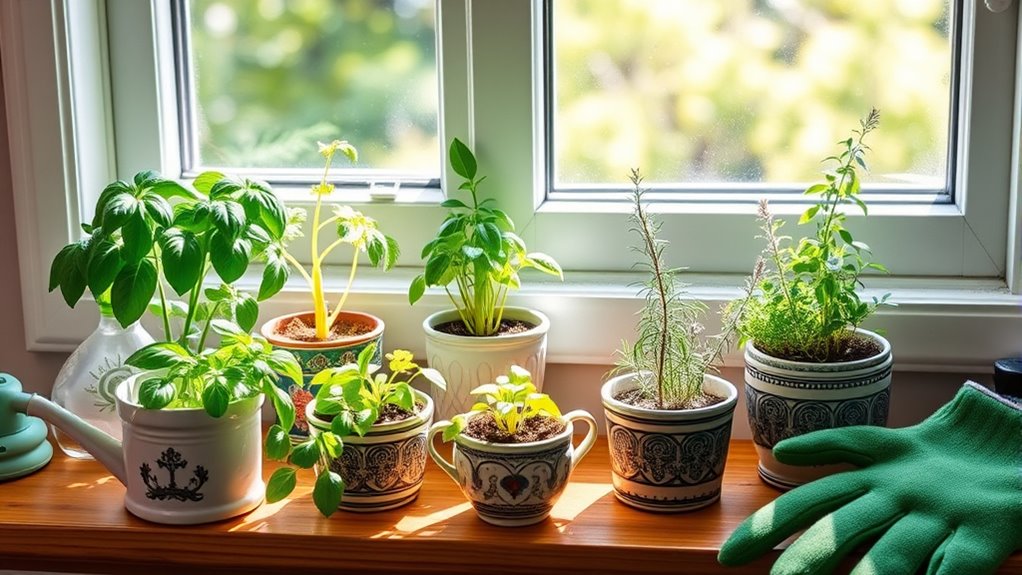
To keep your herbs healthy and thriving, start by carefully removing them from their original containers, gently loosening the root ball to encourage outward growth. Make sure to choose pots with good drainage, and fill them with organic potting mix, covering the roots completely and pressing gently to eliminate air pockets. Herbs need consistent care, so prune regularly by pinching the top 2-3 inches of stems to promote bushier growth and prevent overgrowth. Water thoroughly until excess drains out, then let the soil dry slightly between watering sessions. Monitor your plants for yellow or dead leaves, removing them as needed. Additionally, using self watering planters can help maintain consistent moisture levels, reducing the risk of over- or underwatering. Incorporating sustainable practices into your gardening routine can further support eco-friendly growth. Ensuring proper drainage is crucial to prevent root rot and maintain healthy plants. Proper planting and maintenance, including observing plant health indicators, will help your herbs grow strong and healthy, providing fresh flavors for your kitchen.
Providing Proper Light and Watering
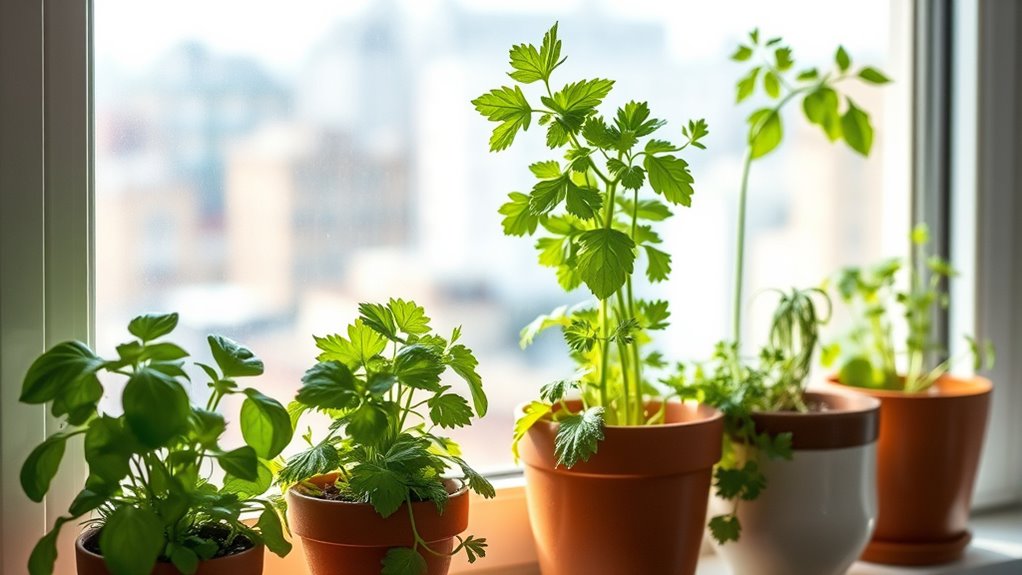
Providing proper light and watering is essential for your herbs to thrive indoors. To encourage healthy growth, place the plant in a south-facing window where it’ll get at least 4-6 hours of direct sunlight daily. Check the soil moisture daily by inserting your finger into the top inch—water only when it feels dry to prevent overwatering. When you water, do so thoroughly until excess drains from the bottom, then empty the saucer to avoid root rot. Use a consistent watering schedule, adjusting for each herb’s needs and your indoor climate. Remember, a little bit of quality potting soil goes a long way toward healthy roots and new leaves. In addition, understanding industry trends can help you adapt your care routine for optimal growth. Incorporating innovative materials can also improve soil health and plant growth, making your windowsill garden even more successful. For example, using biodegradable pots can promote healthier root development and reduce waste. Additionally, selecting lightweight containers makes it easier to move your herbs for optimal sun exposure. Paying attention to soil drainage is key to preventing root rot and ensuring your herbs stay healthy. Proper light and water will nurture your herbs and make your windowsill garden flourish.
Caring for Your Indoor Herb Garden
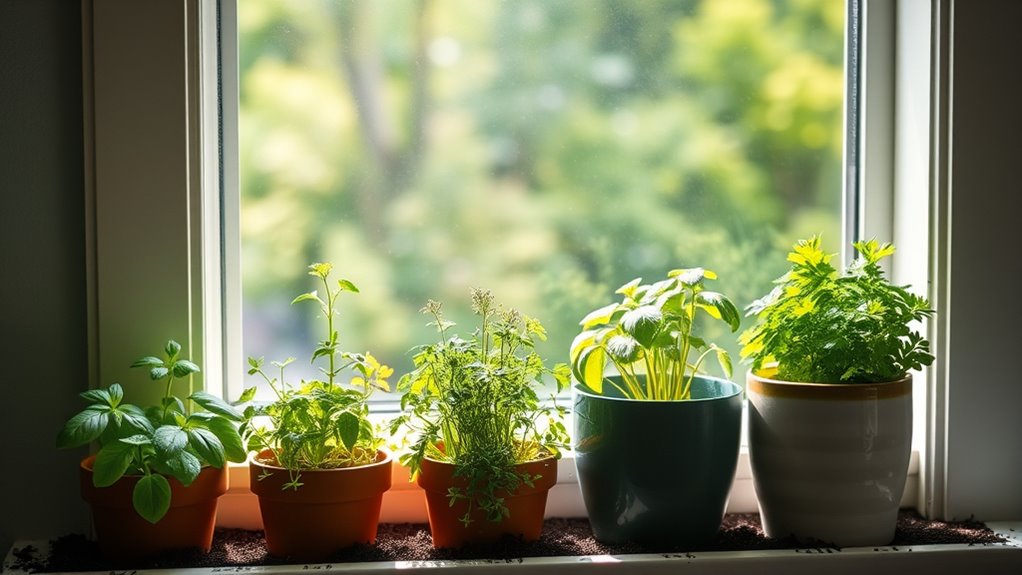
Maintaining a healthy indoor herb garden requires regular attention and care. Proper herb care involves monitoring sunlight, watering, pruning, and drainage. Place your herbs in a south-facing window to ensure they get 4-6 hours of direct sunlight daily, which promotes healthy growth. Check the soil daily and water only when the top inch feels dry, avoiding overwatering that can cause root rot. Use containers with drainage holes and add a tray or saucer underneath to prevent waterlogging. Regular pruning by pinching back stems encourages bushier growth and prevents flowering, which can reduce leaf production. Rotate your herbs periodically to ensure even light exposure, and keep an eye out for pests or stress signs. Providing adequate light exposure is essential for maintaining vibrant and healthy indoor herbs. Ensuring proper plant health supports vigorous growth and flavor development. Using appropriate soil and fertilizers can further enhance the vitality of your herbs, keeping them lush and flavorful. Consistent care keeps your herbs vibrant and thriving indoors, and paying attention to nutrient requirements can help prevent deficiencies that stunt growth.
Frequently Asked Questions
What Herbs Are Easy to Grow on Windowsill?
You’re wondering which herbs are easy to grow on your windowsill. Basil, parsley, and chives are great choices because they tolerate lower light and grow quickly.
Mint and oregano thrive on windowsills and can be propagated from cuttings.
Dill, coriander, and marjoram grow from seeds with minimal care.
Rosemary and sage are hardy and need less frequent watering.
Just make sure they get bright, indirect sunlight and well-draining soil for best results.
How Do You Make a Simple Indoor Herb Garden?
You want a simple indoor herb garden? Start by selecting shallow containers, at least 15-20cm deep with drainage holes. Fill them with quality organic compost, then plant your herbs, spacing them properly.
Place your containers on a south-facing windowsill for ample sunlight. Water regularly, keeping soil moist but not soaked, and prune often.
Use labels to identify herbs and monitor growth, ensuring a thriving, easy-to-maintain garden.
Which Herbs Should Not Be Planted Together?
You should avoid planting mint with other herbs because it spreads aggressively and takes over the container.
Basil and oregano shouldn’t share a pot due to different watering and sunlight needs.
Dill and fennel release chemicals that can hinder nearby plants’ growth, so keep them apart.
Also, herbs like rosemary and basil require different watering, so plant them separately to prevent over- or under-watering.
How Do You Start a Herb Garden for Beginners?
Think of starting your herb garden as planting the first seeds of a flavorful adventure. You choose easy-to-grow herbs like basil, parsley, or mint, which are the friendly guides in your culinary journey.
Pick containers with drainage, fill them with quality organic soil, and place them in a sunny spot.
Water regularly, prune gently, and soon your windowsill transforms into a lush, aromatic sanctuary that’s both rewarding and simple to nurture.
Conclusion
Now that your windowsill herb garden is thriving, you’ve turned a simple space into a lush, fragrant oasis. It’s remarkable how tiny pots can yield fresh flavors, yet it’s equally easy to overlook the care needed behind the scenes. With your attention to light, water, and love, your herbs will flourish just as much as your appreciation for this little green sanctuary. Embrace the journey—your windowsill is now a vibrant, edible haven, where growth and satisfaction grow side by side.
